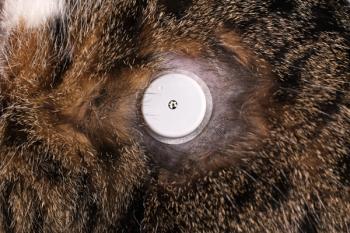
Just Ask the Expert: T4 tests in wolves
I have a question regarding species specificity of the free T4 test. I work at a zoo and was under the impression that this test was species-specific and could not be used in other species.
Dr. Bruyette welcomes endocrinology questions from veterinarians and technicians.
To ask your question, e-mail:
With the subject line: Endocrinology Questions
Q: I have a question regarding species specificity of the free T4 test. I work at a zoo and was under the impression that this test was species-specific and could not be used in other species. In particular, we have found some canids (i.e. Mexican wolves [Canis lupus baileyi] and maned wolves [Chrysocyon brachyuris]) with low total T4 concentrations. Some have signs consistent with hypothyroidism and, some are clinically normal. I have used skin biopsies and other diagnostic tests to narrow my list of differential diagnoses. But my colleague has no concerns about using the free T4 test for these wolves and all sorts of species.
What are your thoughts?
Sandra C. Wilson, DVM, MS
A: Of course I remember you and I am glad to see you are working at a wonderful zoo.
It is an interesting question.
The thyroid hormones, triiodothyronine (T3) and thyroxine (T4) are highly bound to the plasma proteins, thyroxine-binding globulin, albumin, and pre-albumin. Only the unbound (free) portions (approximately 0.03% in the case of T4) are biologically active and responsible for the regulation of thyroid function through the pituitary feedback mechanism. In patients with no underlying systemic illness or condition known to alter binding proteins, the total serum T4 concentration is a specific and sensitive index of thyroid function. However, a change in the concentration or binding of plasma proteins can alter the total T4 concentration dramatically, while the concentration of free T4 remains relatively constant. Under these circumstances, the total T4 measurement will be misleading, and a free T4 concentration is needed to accurately assess the hormonal status of the patient. This may also be done in conjunction with a sensitive thyroid- stimulating hormone (TSH) assay.
The free T4 by equilibrium dialysis or ultrafiltration method is used to remove proteins (including protein-bound T4) from the blood sample. Once these proteins are removed, non-protein bound or free T4 remains. A sensitive assay is then used to measure the small quantity of T4 remaining in the sample resulting in a free T4 value.
Getting back to your question, I cannot find any references on total T4 or free T4 concentrations in wolves, but in theory total T4 assays should be useful because thyroxine should be identical in all species. And since the free T4 dialysis step should not be species-dependent, these assays should work well across species as well. The only issue for both tests is that reference ranges specific for the species being studied would need to be established. Until such species-specific reference ranges are available, we would be using the normal values established for domestic dogs.
If you or others are interested in established reference ranges for wolves let me know and we will see if we can provide a more definitive answer.
Thanks for the question, and it's great hearing from you,
Dave Bruyette, DVM, DACVIM
Medical Director
VCA West Los Angeles Animal Hospital
West Los Angeles, Calif.
The intent of Just Ask the Expert is to address non-urgent medical questions and to share this information through the Web site with other practitioners. The recommendations are for informational purposes only. It is each clinician's responsibility to carefully weigh these recommendations and determine the right course of action for each patient. Please verify any drug dosages discussed. Questions may be edited for style and length.
Newsletter
From exam room tips to practice management insights, get trusted veterinary news delivered straight to your inbox—subscribe to dvm360.




